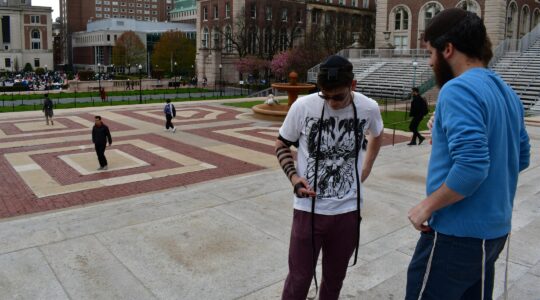WASHINGTON (JTA) – “I am not an American citizen,” Natan Sharansky begins, and then goes on to make a very American case for leniency for Lewis “Scooter” Libby.”I hope that in deciding this sentence, you will consider the views of those like me who experienced him as a fine American public servant and a good man,” the former Israeli Cabinet minister and prisoner of the Soviet gulag wrote May 1 to federal Judge Reggie Walton.Sharansky’s letter, among 174 appealing for leniency – an unusually high number – were to little avail: On Tuesday, Walton sentenced Libby to 30 months in prison, less than the 37-month maximum but considered high by many analysts. Libby was convicted of obstructing the investigation into who in 2003 leaked the name of covert CIA operative Valerie Plame as part of a White House retaliation scheme against her husband, Joe Wilson, a prominent Iraq war critic.Libby, who is Jewish, was the top adviser to Vice President Dick Cheney.”I have always considered him to be a man of the highest intellect, judgment and personal integrity – a man fully committed to protecting the vital security interests of the United States and its citizens,” Cheney said in a statement. “Scooter is also a friend, and on a personal level [my wife] Lynne and I remain deeply saddened by this tragedy and its effect on his wife.”Sharansky was not the only major Jewish figure writing on Libby’s behalf. Indeed, the letters seemed equally divided among leading Jewish public policy figures; leading personalities from Wyoming, Cheney’s home state; Libby’s former government colleagues; and friends and neighbors, including his dentist.The Federation of American Scientists’ Secrecy Project published all the pleas in favor of leniency and a dozen or so asking for a tough sentence.”At a time when our country has narrowly escaped a Constitutional crisis, and when our entire judicial system is in question, the sentence that Scooter Libby receives will send a message across the world about America and democracy,” wrote Terry Olson, a fifth-grade teacher who urged a maximum sentence.Some of the notable names pleading for leniency included Henry Kissinger and Leonard Garment, the Nixon administration’s secretary of state and special counsel, respectively; Donald Rumsfeld, Paul Wolfowitz, Richard Perle, Douglas Feith and John Bolton, all former senior officials of the Bush administration and architects of the Iraq war; James Woolsey, a fomer CIA chief; and Stuart Stevens, a Republican political strategist with close ties to the pro-Israel community.Also, Deborah Tannen, Libby’s neighbor in McLean, Va., and an author of books on how men and women communicate; Eliot Cohen, a Middle East analyst about to start service as a top foreign policy adviser to Condoleezza Rice, the secretary of state; Norman Podhoretz and Midge Decter, the first couple of neoconservative theory; and Walter Reich, a former director of the U.S. Holocaust Memorial Museum.Arye Genger, a New York businessman who served as a liaison between former Israeli Prime Minister Ariel Sharon and the Bush administration, credited Libby with trying to reduce civilian casualties among Israelis and Palestinians during the second intifada. “His meticulous efforts with regard to issues concerning the prevention of loss of innocent lives and human suffering on both sides were remarkable,” Genger said.Also attesting to Libby’s dedication to bringing about Israeli-Palestinian peace was James Wolfensohn, the former World Bank president and major Jewish philanthropist who until recently was a top peace envoy to the region.Dennis Ross, the Clinton administration’s top Middle East envoy, said that notwithstanding political differences, he and Libby were friends, adding that he “fears the criminalization of policy differences.” Perhaps the most poignant letter was from Leon Wieseltier, the Jewish philospher and writer who said Libby had helped his family out of a legal situation some years ago and “did not charge us a dime.” Wieseltier said that ideologically he is “despised” by neoconservatives like Libby, but added: “We do not have the same politics, but there is more to life than politics, even in Washington. About his character I would put my own hand on the Bible.”





